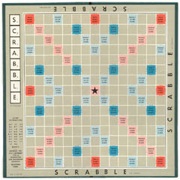
|
About OgreCave and its staff
|

|
by Demian Katz
This review is part of OgreCave's Gaming 101 course. Pay attention - there will be a quiz. Maybe.
The king of the crossword games, Scrabble holds on to its popularity more than sixty years after its creation and has never been surpassed by its many imitators.
How it works
Why you should know this game Scrabble is effortless to pick up and play - looking at letters and putting words on the board comes pretty naturally to most literate people. However, the game has significant depth, as evidenced by its significant number of hard-core competitive players (see "Word Freak" by Stefan Fatsis for more on this). The most obvious source of the game's flexibility is the depth of the English language; these hundred tiles can be put to a lot of uses. Scrabble is a great way to show off your vocabulary, and for serious players, it's a good excuse to expand it. Playing humorous combinations of words or trying to bluff your opponents with fake ones add further entertainment value. However, the second level of depth to the game comes from the strategy involved in placing words. It's not enough to come up with a clever word - you also have to find the most profitable position for it. By watching the board closely, small words can be put to spectacular use, so right-brained and left-brained competitors have a fair shot against each other in spite of their differing talents. Obviously, the game is not for everyone - if you don't enjoy playing with words, you're unlikely to love Scrabble, even with its placement strategies. However, if you're not dead set against it, you have to admire it for its longevity and sheer playability. If you haven't dragged this one out in a while, it's worth revisiting; you may not run off to the tournaments right away, but you'll probably find that it's an hour or so well spent.
|
||||
 Scrabble
Scrabble Scrabble really defined the modern word game, and because of its
influential position, it would probably hold a place in gaming history
even if it were a lesser game. What makes it particularly noteworthy,
though, is that it holds up so well; Alfred Butts not only popularized a
subgenre of gaming, but he also managed to get it right the first time.
Countless imitators have come along in the decades since Scrabble's
first publication, but even the best of them tend to feel like Scrabble
with one or two minor tweaks. Scrabble remains at the top of the heap
primarily by combining simple and accessible gameplay with hidden depth
and complexity.
Scrabble really defined the modern word game, and because of its
influential position, it would probably hold a place in gaming history
even if it were a lesser game. What makes it particularly noteworthy,
though, is that it holds up so well; Alfred Butts not only popularized a
subgenre of gaming, but he also managed to get it right the first time.
Countless imitators have come along in the decades since Scrabble's
first publication, but even the best of them tend to feel like Scrabble
with one or two minor tweaks. Scrabble remains at the top of the heap
primarily by combining simple and accessible gameplay with hidden depth
and complexity.